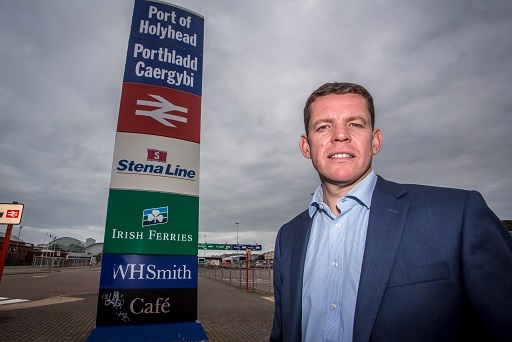Ynys Môn Assembly Member Rhun ap Iorwerth spoke about the challenges facing Holyhead Port in the face of Brexit at the National Assembly for Wales yesterday.
He was speaking during a debate on the Assembly’s External Affairs Committee’s report on the implications of leaving the European Union on Wales’ Ports. As part of their inquiry, the Committee had heard evidence from Irish Ferries and Stena Line.
Speaking at the Senedd, Rhun said:
“Since the beginning of the nineteenth century, Holyhead port has grown. Some of my forefathers were among those who made their livelihoods serving the postal, goods and passenger ships. Well over 1,000 people are still employed directly in the port of Holyhead—far more in the wider economy are reliant on the port. Four and a half million tonnes of goods pass through annually. Only Dover is bigger in terms of roll-on, roll-off services.
But, if Holyhead has been created and defined by its port in the past, there is no hiding the threats facing it now. Any barrier to the flow of vehicles and goods is a threat to the port of Holyhead, and is, therefore, a threat to the well-being of the people of Holyhead. If a hard border were created between Holyhead and Dublin, clearly it would become less attractive for people to travel and do business through Holyhead. We are talking about 2 million travellers, 0.5 million vehicles and 400,000 goods vehicles.
“The process of moving freight always follows the easiest route and the simplest route. Therefore, there’s a real concern that if there were a soft border between Northern Ireland and southern Ireland, and a hard border between Wales and the Republic of Ireland, it would have a very negative impact on us. Irish Ferries said that could have serious economic impacts on Welsh ports, in terms of direct and indirect employment.
“The other threat then, of course, is Britain leaving the customs union. Since the creation of the European Union single market in 1993, abolishing the toll checks between Wales and Ireland, the amount of cargo travelling between Holyhead and Dublin has increased incredibly—almost 700 per cent since the early 1990s. We would also need to change the structure of the port, if there were a need for new checks. Quite simply, according to the port managers, the capacity isn’t there
“We are facing a series of challenges here. It’s not just a proud history but a confident and prosperous future that I want to see for the port of Holyhead.”
You can listen to the full speech here:


